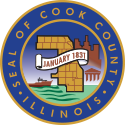Connecting Cook County - Long Range Transportation Plan

Long Range Transportation Plan
Cook County Board President Toni Preckwinkle and the Cook County Board are committed to strengthening transportation in the region. Our goal is to develop a plan that looks at transportation from a variety of perspectives—private automobiles, highways, bridges, public transportation, pedestrian access, bikeways, freight rail and trucking corridors, commerce—and is based on the premise that we must use our transportation resources to support the growth and economic vitality of communities in Cook County.
Connecting Cook County, the Long Range Transportation Plan (LRTP) for 2040, will include:
- A vision statement that identifies the desired outcomes of the County’s transportation investments;
- An analysis that pinpoints the strengths and weaknesses of the County’s transportation system relative to expected growth;
- A scenario that best achieves our goals;
- A policy framework to guide the ranking and selection of transportation projects;
- A list of priority capital projects and network improvements;
- A financial analysis that outlines how improvements will be funded; and
- An action plan that spells out the responsibilities of regional transportation agencies.
The plan will serve as a road map for the design and implementation of a fully integrated multi-jurisdictional transportation system that serves individuals and businesses and improves the County’s competitiveness.
Your contributions to the planning process are crucial. They will enhance the evaluation and identify ways to strengthen connections between different forms of transportation, eliminate system gaps, enhance safety and leverage investments.
Cook County Board of Commissioners Accepts Freight Plan
On Wednesday, October 17, 2018, the Cook County Board of Commissioners accepted the final Cook County Freight Plan, prepared by the Department of Transportation and Highways. Building upon Connecting Cook County’s recommendation to support the region’s role as North America’s freight capital, the Freight Plan makes the case for investment in a robust, multimodal freight system, as well as the development of policies that will ensure safe and efficient movement of goods within the County. “As our economy continues to transform, government plays a vital role in ensuring that our infrastructure remains a strong foundation for continued job growth and prosperity for our residents,” President Preckwinkle said. “The Cook County Freight Plan enhances an already robust road and rail infrastructure.”
Lincoln Highway Logistics Corridor Strategic Plan
Completed in August 2018, the Lincoln Highway Logistics Corridor Strategic Plan analyzed how rail-adjacent, industrially zoned sites in Chicago Heights, Ford Heights, and Sauk Village could be developed for businesses that are dependent on rail service. Through this process, the Department of Transportation and Highways (DoTH) worked with municipalities, South Suburban Mayors and Managers Association, Cook County Department of Environment and Sustainability, Cook County Bureau of Economic Development and its Department of Planning and Development, Cook County Land Bank Authority, Cook County Forest Preserve, Metropolitan Water Reclamation District, and other stakeholders to identify and evaluate 21 sites for improvement. DoTH and its partners identified six priority redevelopment sites and produced a strategic plan describing the types of industries best suited for the Lincoln Highway Logistics Corridor and how stakeholders can position these sites to attract these industries.
Lincoln Highway Logistics Corridor Stakeholder Meeting
The South Cook Mobility Study
Completed in May of 2019, the South Cook Mobility Study (SCMS) is a first step in developing a County-wide transit plan as recommended in the 2040 Long Range Transportation Plan. Over the course of decades, the loss of jobs within and near south Cook County combined with the growth of jobs in northern and western portions of the County has diminished access to jobs and other destinations (schools, stores, and entertainments). For south suburban residents, this more limited access is reflected in average round trip work commutes of nearly 24 miles—the longest in the County—and far fewer jobs accessible by car and transit within 30 and 45 minutes of home respectively. It is also reflected in declining ridership on the Metra Electric and the Rock Island districts, the only two lines in Metra’s system to lose ridership in the 16-year period from 2002 to 2017. A core principle in the study is to maximize the use of existing transit infrastructure and to make transit services more seamless and complementary. The SCMS made an apples-to-apples comparison of several different proposed transit improvements to see which led to the greatest increase in ridership at the least cost. Based on input from transit agencies and community advocates, a few combined scenarios were analyzed and form the basis for a fare pilot which the County seeks to implement in the near future.
